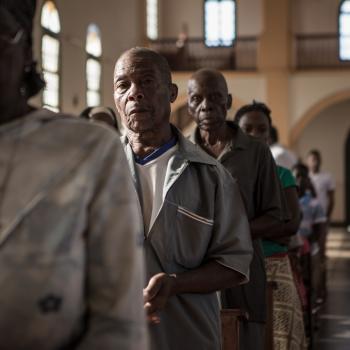 I cling to Christmas. I’d like to say that I have some tradition to which I hew—celebrating exactly twelve days of Christmas, say, or keeping my garland nailed up until the end of whatever date anthropologists think marks the end of the pagan winter solstice.
I cling to Christmas. I’d like to say that I have some tradition to which I hew—celebrating exactly twelve days of Christmas, say, or keeping my garland nailed up until the end of whatever date anthropologists think marks the end of the pagan winter solstice.
I used to aspire to traditions, now I aspire to survival. So cling is the right word.
I grab hold after Thanksgiving, as soon as I can slow the carousel of work and life. I don’t pull the brake until after Thanksgiving, because I instinctively resist being made to do anything. Every year, the desperate big-box retailers try to gin up our holiday shopping a little earlier, and I don’t like the pressure one bit.
I swear, as God is my witness, my local Wal-Mart was playing Mariah Carey’s rendition of “All I Want for Christmas is You” a full two weeks before Thanksgiving this year. Overcoming the perennial commercial Christmas bullying to put up my tree is like starting a meal with a full case of indigestion.
I choke it down by reminding myself that the only thing their retail bacchanalia has in common with Christmas is that both end with people crying in the fetal position. Unless, that is, you’re one of those people who subscribes to the “no crying He makes” heresy, which I am not, though you can still hear me belting out that verse at least once in my living room between roughly December first and January thirty-first.
Yeah, January thirty-first. Because I cling, you see. My neighbors should give thanks that my time and budget keep me from stringing up a million non-twinkling lights, Clark Griswold-style, because otherwise they would be enjoying the feel of living next to an airport a solid one-sixth of the year. You can have my Christmas garland when you pry it from my eggnog-sticky fingers.
I don’t have any sound theological or aesthetic justifications for my clinging. My Orthodox Christian friends, they have both, in spades. They start the Christmas season with mourning. The Christ is born to die, after all. He comes as a baby, he comes to be scorned, he comes to be hung up and gouged with a spear in front of his own mother. Shouldn’t that remembrance at least give us pause?
Most Christians treat Christmas as a homecoming celebration, but my Orthodox friends fast and quietly mourn because they recall the tombs—the tombs of the children murdered after Joseph and Mary quietly slipped out of Bethlehem, the tomb of their savior, the tombs that await each one of us.
I’m not so good at remembering the tomb unless I am sick. New Year’s Eve I lay on my bed in a fever, periodically checking WebMD to see if the symptoms were yet distinct enough to ascertain whether I would be dying of swine flu or spinal meningitis. I thought of the tomb then, and of my friend who told me once that he hopes to know with plenty of warning when his death is coming, so that he may have more time to repent.
He’s a more knowledgeable and devout Christian, this friend, than any of my friends in the everything-is-forgiven-as-soon-as-you-tell-God-you’re-sorry camp, so that wish of his has haunted me. Repentance. Christmas is a good time to give it at least a thought.
I confess it’s not repentance that keeps my lights up and Handel’s Messiah playing in my office while other people turn their attention to first-quarter business goals and NFL playoffs. I don’t really have a good reason, except to say that I’ve often found closer communion with God resting beneath my pagan, multi-color bulbed Christmas tree than I’ve had listening to nearly every preacher I’ve ever heard prattle on.
My birthday is a week before Christmas, and I remember waking one early birthday morning as a child, to the sound of the Beatle’s “Birthday” blaring on the record player. My stepfather was sleeping on the floor by a speaker, a mostly empty bottle of Jack Daniels by his head. It didn’t bother me, though, to find him that way, because there were Christmas lights on the tree. The lights made everything seem okay—the noise, the sight of him, the smell of whiskey. The lights always seem to make things better.
In my purer theological days I would have labeled my devotion a childhood fixation. I have made the pagan trappings of secular Christmas a form of security blanket, like that of Linus in It’s Christmas, Charlie Brown, which plays in my house more times than I can count during this season.
I’m fine with the security blanket theory. I’m fine with clinging. Immanuel means God with us, and I am clinging to this as well, to God with us, to God with me, because more than presents or Santa or Christmas cookies, the lights make me feel the presence of a God who declares, amidst all the negative claims about his inscrutability, that he is love. He is enfleshed love, and he is light, and in that light all things look new. Or perhaps, just as if they could become renewed.
God with us, God with you, God with me. Maybe it’s not so bad to cling to that notion.











